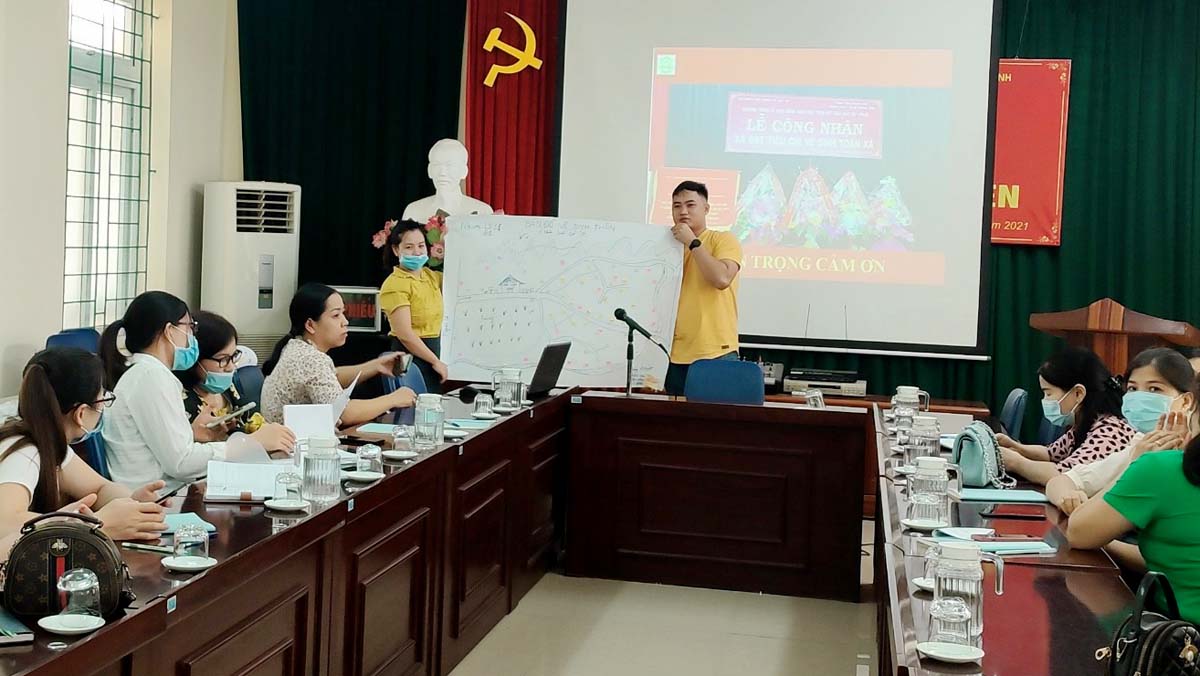
(HBO) – The programme on results-based scaling up rural sanitation and water supply, funded through a World Bank loan, has been carried out in Hoa Binh province since 2018. Among the relevant agencies and units assigned by the provincial People’s Committee, the health sector is in charge of coordinating the implementation of the tasks to achieve three main targets, namely 60 communes meeting "commune-wide sanitation” standards, 30 others "sustainable commune-wide sanitation”, and 85 water supply facilities and toilets of communal health stations upgraded or built.

Key provincial and district personnel draw communication maps to improve awareness and practices of sanitation in rural areas.
Deputy Director of the provincial Health Department Hoang Thi Thuy said the health sector has been pushing ahead with implementing the programme to expand the coverage of hygienic toilets, thus improving environmental hygiene in rural areas, reducing hygiene-related diseases, and help achieve the targets of the national strategy on rural sanitation and water supply.
Due to impacts of the COVID-19 pandemic, the programme was extended to the end of 2022.
The implementation also faced certain difficulties, including a lack of manpower, especially during the COVID-19 pandemic, she noted, adding that it was also not easy to select communes to carry out the programme, particularly when rural residents’ awareness and economic conditions were still limited.
In the face of such difficulties, the Health Department has made annual implementation plans which identified roadmaps and targets. In particular, the sector has provided training for key provincial and district personnel, who later would implement the programme in the targeted communes and hamlets via a wide range of activities, including disseminating information via megaphones and community meetings, drawing propaganda posters, and facilitating the market of hygiene equipment.
In the initial phase, financial aid of 1 million VND (42 USD) was given to each poor household, and 500,000 VND to each near-poor to help build hygienic toilets. Since 2020, financial assistance was no longer provided but focus has been put on communications to raise public awareness and change hygiene practices by each people, each family, and the entire community.
Thanks to strong efforts, the rate of rural households with hygienic toilets in Hoa Binh province has gradually increased, to 71.75% in 2018, 79.15% in 2019, 82.56% in 2020, and 83.74% in 2021. The figure is expected to reach 85% in 2022.
The Health Department targets that in 2022 - the last year of the programme, all households, along with teachers and students of schools in the eight communes that have achieved "sustainable commune-wide sanitation”, would access relevant information and build or use hygienic toilets. Besides, eight communal health stations of four districts would have clean water supply facilities, hygienic toilets, and usable hand washing places.
So far, the health sector has obtained its three main targets, helping improve rural environmental hygiene and creating an important stepping stone for districts in Hoa Binh to press on with the work and build civilised new-style rural areas./.
The emulation movement "Hoa Binh joining hands to build new-style rural areas” has been widely spreading, becoming a driving force that motivates the localities to renew rural landscapes and improve the material and spiritual lives of the residents. In this movement, the people play a central role-both as the main implementers and direct beneficiaries of its outcomes.
In response to the global digital revolution, Hoa Binh Newspaper is transforming itself into a modern and multi-platform media hub, blending cutting-edge technology with a restructured newsroom and a new generation of tech-savvy journalists.
Hoa Binh province’s Association of the Elderly recently held a conference to review the project on expanding the inter-generation self-help club model until 2025.
In a move to implement Resolution No. 57-NQ/TW, issued on December 22, 2024 by the Politburo, which targets breakthroughs in science-technology development, innovation, and digital transformation, the Hoa Binh provincial Department of Health has issued a plan to roll out the "Digital Literacy for All” campaign within the local health sector.
An Nghia Commune (Lạc Sơn District) is one of the communes that achieved the tha standard of the national new rural area in 2018. Entering a new development phase, the commune is now trying to meet the criteria for the advanced new rural development. With the strong political will and the public consensus, the commune is gradually overcoming the challenges to reach this goal, aiming for the sustainable development.



